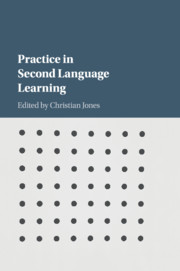Book contents
- Practice in Second Language Learning
- Practice in Second Language Learning
- Copyright page
- Contents
- Figures
- Tables
- Contributors
- Foreword
- Introduction
- Part I Theoretical Perspectives
- Part II Receptive Practice
- Part III Productive Practice
- 6 Using Computer-assisted Language Learning (CALL) Tools to Enhance Output Practice
- 7 Practising Online with Your Peers: The Role of Text Chat for Second Language Development
- 8 Language Practice and Study Abroad
- 9 How Does Collaborative Practice Facilitate Learning? Processes Involved in a Wiki-mediated Collaborative Writing Task
- 10 Conclusion
- Index
- References
8 - Language Practice and Study Abroad
from Part III - Productive Practice
Published online by Cambridge University Press: 27 February 2018
- Practice in Second Language Learning
- Practice in Second Language Learning
- Copyright page
- Contents
- Figures
- Tables
- Contributors
- Foreword
- Introduction
- Part I Theoretical Perspectives
- Part II Receptive Practice
- Part III Productive Practice
- 6 Using Computer-assisted Language Learning (CALL) Tools to Enhance Output Practice
- 7 Practising Online with Your Peers: The Role of Text Chat for Second Language Development
- 8 Language Practice and Study Abroad
- 9 How Does Collaborative Practice Facilitate Learning? Processes Involved in a Wiki-mediated Collaborative Writing Task
- 10 Conclusion
- Index
- References
Summary
- Type
- Chapter
- Information
- Practice in Second Language Learning , pp. 197 - 227Publisher: Cambridge University PressPrint publication year: 2018
References
- 2
- Cited by



